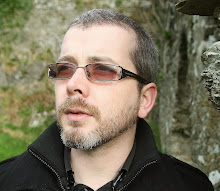Sunday, 9 March 2014
Tropic Moon by Georges Simenon
I'm a little frazzled from lack of sleep and the tail end of some annoying virus (infecting me rather than my laptop -- ho-ho-sigh) so I don't expect any major insights to hit the screen as I rattle through the motions here.
I do not blame Simenon for this mood, incidentally. Bet that's put him at ease.
He MIGHT Google this, no...? Ah, a Bing man, eh...? Oh, right. RIP, then.
Really enjoyed this read. Simenon made me feel uncomfortable, impressed and satisfied with a book that had a lot to say about racism. It was first published in 1933. 81 years on and it still seemed relevant. Mind-blowing.
My original reason for picking this up was that I was trying to find another example of behaviourist* POV. Took a roll of the dice with this one. French writer, same publisher as the Manchette translations I've read, it post-dates Hammett's The Maltese Falcon by four years (though I haven't looked into when TMF might have seen a French translation)... alas, this was an example of third person limited (a good example) and not third person objective POV. Still, a worthy read. I'll hunt out more of these romans durs and probably look for a Maigret omnibus too. Some time.
Here's a link to a recent(ish) review of the book on The Guardian website. It seems entirely on point to me.
*a current obsession mentioned and poorly explained in a good portion of the books I've documented since January. I'll actually write a post about the writing POV when I'm more adept at explaining it.
Wednesday, 5 March 2014
Nivelli's War by Charles Way - presented by Cahoots NI
Last night I attended the opening performance of Nivelli's War by Charles Way with my wife and my nine-year-old daughter at The MAC Theatre in Belfast. I am indebted to the play now, as it provided such a spectacular introduction to 'grown-up' theatre to my first-born.
Cahoots NI presented an intensely atmospheric play that had my daughter giggling one second and squeezing my hand in anticipations of danger the next. The cast is stellar: Dan Gordon, Sam Clemmett, Kerri Quinn, Abigail McGibbon, Bob Kelly, Michael Lavery and Faolan Morgan. The seven actors interact with each other like a well-oiled machine, each one providing their own special brand of magic in a show that relies heavily on suspension of disbelief. But if you believe in the magic, the payoff is more than generous.
Following the tribulations of young Ernst, a boy evacuated from his home in Frankfurt and then abandoned by his new carer, Tante Sophie, in mysterious circumstances, the play is set during the tail-end of the Second World War. German aristocracy, Russian and American soldiers and a snarky hobo contribute to what is at heart a tale about family and honour with a dash of the fantastical thrown in.
Every element of the production team was on point. If anybody missed a beat, I didn't pick up on it. The beautiful piano music, combined with a trigger-happy fog machine and moody lighting, created a world of smoke and shadows with occasional and powerful licks of colour, such as the wondrous image of a simple red balloon.
One of my performance highlights was the lesson in shrugging passed down from Mr H (Bob Kelly) to Ernst (Sam Clemmett). I was also steadfastly captivated by the understated yet mischievous performance of Dan Gordon as The Great Nivelli of the future who served as an active filter to the sad past.
Loved it. I urge you to go see it.
Nivelli's War will play at The Mac Theatre from 4-11 March. Book your tickets here.
Labels:
cahoots ni,
nivelli's war,
the mac belfast,
theatre review
Monday, 3 March 2014
The A26 by Pascal Garnier
My first Pascal Garnier read, and far from a disappointment. It was chosen in the pursuit of another example of behaviourist POV (it seems to be a particularly popular choice in French fiction, you see), although on reading I found that The A26 didn't employ a very strict use of the perspective. Thoughts from the main characters were divulged in a number of places, and little was withheld from the reader.
And yet it still makes for an interesting study. At multiple points in the book there is a very definite narrative disconnect. In the opening chapter, for example, Yolande is described as "anywhere from twenty to seventy" and "You would catch a glimpse of her sometimes in a way she had of sitting down, tugging her skirt over her knees, of running a hand through her hair, a surprisingly graceful movement in that wrinkled skin glove." A powerful picture of an aging woman, and very much one from the author's perspective rather than Yolande's. This style of description pops up throughout and serves to present the characters, almost like displays in a glass case.
Especially in Yolande, this style contributes to a separation from the real world. Her self-imposed isolation is tempered only by the fact that her brother, Bernard, lives in the same house as her. But he's not really company. More of an enabler of her strange behaviour. He entertains her, provides for her, goes out to get the groceries that she won't leave the house for. But he won't be around to act as Yolande's carer for much longer. It is quickly revealed that he is terminally ill, and not for this world much longer.
And this illness provides a freedom for Bernard that allows him to take on a perverse crusade along the developing A26 motorway that is being constructed close to his house.
The A26 is an odd little book, but incredibly captivating. It's an addictive read and a fascinating insight into a couple of very damaged people. This is not a story that will provide a satisfactory resolution to crime, but rather it explores how the deeds themselves can punish the perpetrators. I loved it for its ugliness, and will read more Garnier quite soon, no doubt.
Labels:
100 books,
8/100,
behaviourist,
pascal garnier,
the A26
Sunday, 2 March 2014
It's an honour, of course... now help me win!
Big Al's Books and Pals have announced the shortlists for their 2014 readers' choice awards, and I've made it into the crime fiction category. Here's how the list looks:
Aye, no bother at all, like.
So, yeah, that's how stiff the competition is. If you fancy throwing a vote my way, you can find the categories here. Get clicking!
You can read an extract from WEE DANNY on Austin Tanney's blog.
Labels:
big al's books and pals,
nominee,
vote,
wee danny
Saturday, 1 March 2014
The Getaway by Jim Thompson
Everything I wanted to say about this book has been coloured by the somewhat surreal ending. But I don't do spoilers on this blog (no matter how old the book is), so that makes writing about this one rather difficult. So let's just say it was a humdinger, eh? Highly recommended, if you care.
Thompson did a few interesting things with POV in this one as well. Not strictly behaviourist as I've come to understand it, but certainly it borrows from the style in parts to heighten tension and/or intrigue.
If you want a great read about a couple of charming criminals and the lengths they'll go to to getaway (see what I did there?), and you enjoy a writer with a keen sense of justice, then you could do a lot worse than to visit Doc and Carole McCoy's world.
Labels:
100 books,
7/100,
behaviourist,
jim thompson,
the getaway
Subscribe to:
Comments (Atom)









